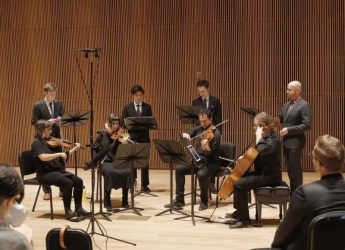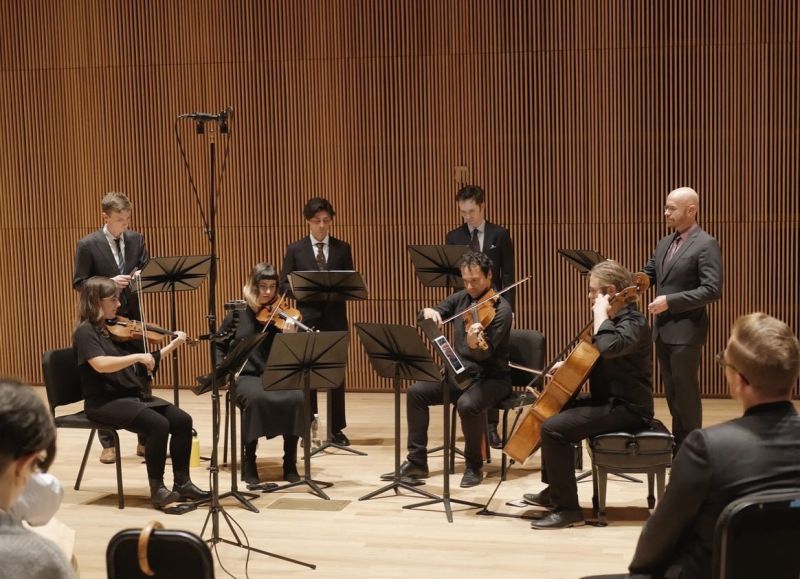 United States Rihm: Hannah Harnest (piano), Sophie Delphis (mezzo-soprano), Abigel Kralik (violin), Julian Schwarz (cello), Mivos Quartet, Ekmeles, Cary Hall at the DiMenna Center, New York City, 19.10.2019. (DS)
United States Rihm: Hannah Harnest (piano), Sophie Delphis (mezzo-soprano), Abigel Kralik (violin), Julian Schwarz (cello), Mivos Quartet, Ekmeles, Cary Hall at the DiMenna Center, New York City, 19.10.2019. (DS)

Rihm – Zwei kleine Lieder nach Gddichten von Eduard Mörike; Vier späte Gedichte von Friedrich Rückert; Fremde Szene II; Et Lux (US premiere)
Mivos Quartet
Olivia De Prato (violin)
Maya Bennardo (violin)
Victor Lowrie Tafoya (violin)
Tyler J. Borden (cello)
Ekmeles
Tim Keller (countertenor)
Tomas Cruz (tenor)
Jeffrey Gavett (baritone)
Steven Hrycelak (bass)
New Yorkers like to think the city gives them access to everything all the time. But a concert of works by Wolfgang Rihm in a recent fall series coordinated by the German Consulate proved this wrong. The city has been severely lacking in new and stunning European compositions, especially from the Darmstadt school.
The Mivos Quartet and singers from Ekmeles offered a corrective, collaborating in the US premiere of Rihm’s 2009 nearly one-hour Et Lux. Rarely are New York audiences privy to a masterwork that not only requires precision of technique — challenging the most complex engineering of talents — but also demands a superior instinct to deliver pioneering forms with care and beauty.
Et Lux is based upon text fragments from Latin liturgy that resound in spiraling, repetitive verse. To describe it is a challenge: a standard, medieval plainsong reinvented, continuously, in an everchanging futuristic aesthetic that organically modifies over centuries of human experience.
The score is not for the faint of heart, both for listeners and musicians. In a feat of timing and precise intonation, the singers and instrumentalists held tension and maintained partnership with colleagues for almost an hour. The result was a heavenly sense of beauty that can be best described as sound wrapped in wonder — like a relic from an ancient ritual, unlikely to have survived and only witnessed by those present in a lucky, passing moment.
While Et Lux could have easily shouldered a full evening, the concert included other works by Rihm that expressed the expanse of his compositional terrain. Fremde Szene II required a trio with Hannah Harnest, Abigel Kralik, and Julian Schwarz in a collage of impressions, emotions, and interpretations of Schumann to whom the work is a direct ‘declaration of love’. The musicians combined vulnerable, emotional content with a sustained, reverent power that supported the message and framed its creative backbone. They led the listener through a maze of intriguing, puzzle-like structures, which were equally exciting and delicious.
The lightest fare — only compared to the earlier works — was a set of songs by mezzo-soprano Sophie Delphis, with Harnest on piano. In these works, Rihm continues the German lieder tradition with updated, 21st-century settings of poems by Eduard Mörike and Friedrich Rückert. Delphis and Harnest performed the set with interpretive variety and crisp clarity that balanced lyrics and melody, both harmonious and dissonant.
Daniele Sahr
